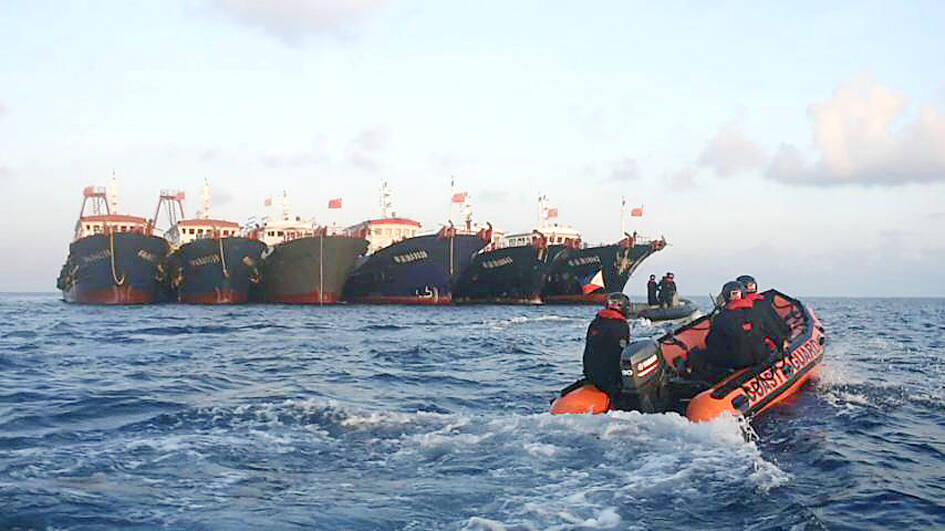The Chinese maritime militia is operating hundreds of civilian fishing vessels to conduct “gray zone” campaigns in the Taiwan Strait, a US-based think tank said in a report this month.
Beijing is deploying dual-use and unmarked fishing vessels to engage in surveillance and harassment operations with the aim of coercion and paving way for military actions without risking an open conflict, the Center for Strategic and International Studies (CSIS) wrote on Oct 8.
The CSIS said its analysts tracked the GPS and automatic identification system (AIS) signals of 315 China-flagged fishing vessels to isolate watercraft operated by China’s maritime militia from other civilian boats.

Photo: Philippine Coast Guard via AP
The center’s research group mapped hot zones of genuine fishing activity in waters across the globe to identify Chinese military boats in disguise, it said.
The analysis is based on data gathered during the Chinese People’s Liberation Army’s (PLA) Joint Sword-2024A and 2024B exercises, the CSIS said.
Researchers flagged 128 to 209 Chinese boats as suspicious, because they had spent more than 30 percent of sailing time in drill areas or less than 10 percent in waters used for fishing, it said.
They additionally found that 209 vessels displayed AIS anomalies — including “going dark, changing identifiers, or reducing or attempting to mask their AIS movements” — in or near military exercise zones, the CSIS said.
Some of the vessels changed their names in the international ship registry during periods of AIS blackout or weak signal, it said.
One vessel appeared to have used 11 distinct mobile maritime service identification serial numbers and changed them 1,300 times in a year, the CSIS said.
The intelligence agencies of the US and its allies should map the corporate ownership networks linked to suspicious vessels to identify the shell companies on which China relies to operate disguised military vessels, it said.
“Publishing and punishing a rolling blacklist of repeat offenders through sanctions on owners, insurers and operators would raise costs and shrink deniability,” the CSIS added.
Meanwhile, the Ministry of National Defense in a report to lawmakers last week said that the PLA from January to last month had launched 3,003 sorties over the Taiwan Strait median line and sailed 2,000 vessels into the nation’s exclusive economic zone.
China operates aircraft and vessels in the areas surrounding Taiwan proper three to four times a month on average, it said.
Taiwan is developing long-range uncrewed vehicles with high-resolution optical devices, infrared devices and radars to bolster the air force and navy’s reconnaissance capabilities, it added.
Such drones would be plugged into a common platform to enable real-time intelligence sharing between branches of the armed forces and foreign military partners, the ministry said.
The armed forces continue to use joint intelligence gathering systems to monitor Chinese activities and respond with appropriate force to potentially threatening movements to protect the nation’s sovereignty and security, it added.
Additional reporting by Chen Chih-chen

The manufacture of the remaining 28 M1A2T Abrams tanks Taiwan purchased from the US has recently been completed, and they are expected to be delivered within the next one to two months, a source said yesterday. The Ministry of National Defense is arranging cargo ships to transport the tanks to Taiwan as soon as possible, said the source, who is familiar with the matter. The estimated arrival time ranges from late this month to early next month, the source said. The 28 Abrams tanks make up the third and final batch of a total of 108 tanks, valued at about NT$40.5 billion

Two Taiwanese prosecutors were questioned by Chinese security personnel at their hotel during a trip to China’s Henan Province this month, the Mainland Affairs Council (MAC) said yesterday. The officers had personal information on the prosecutors, including “when they were assigned to their posts, their work locations and job titles,” MAC Deputy Minister and spokesman Liang Wen-chieh (梁文傑) said. On top of asking about their agencies and positions, the officers also questioned the prosecutors about the Cross-Strait Joint Crime-Fighting and Judicial Mutual Assistance Agreement, a pact that serves as the framework for Taiwan-China cooperation on combating crime and providing judicial assistance, Liang

A group from the Taiwanese Designers in Australia association yesterday represented Taiwan at the Midsumma Pride March in Melbourne. The march, held in the St. Kilda suburb, is the city’s largest LGBTQIA+ parade and the flagship event of the annual Midsumma Festival. It attracted more than 45,000 spectators who supported the 400 groups and 10,000 marchers that participated this year, the association said. Taiwanese Designers said they organized a team to march for Taiwan this year, joining politicians, government agencies, professionals and community organizations in showing support for LGBTQIA+ people and diverse communities. As the first country in Asia to legalize same-sex

MOTIVES QUESTIONED The PLA considers Xi’s policies toward Taiwan to be driven by personal considerations rather than military assessment, the Epoch Times reports Chinese President Xi Jinping’s (習近平) latest purge of the Chinese People’s Liberation Army (PLA) leadership might have been prompted by the military’s opposition to plans of invading Taiwan, the Epoch Times said. The Chinese military opposes waging war against Taiwan by a large consensus, putting it at odds with Xi’s vision, the Falun Gong-affiliated daily said in a report on Thursday, citing anonymous sources with insight into the PLA’s inner workings. The opposition is not the opinion of a few generals, but a widely shared view among the PLA cadre, the Epoch Times cited them as saying. “Chinese forces know full well that